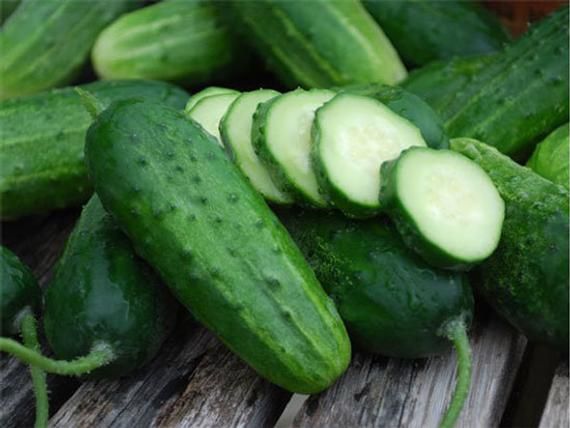Cucumbers known scientifically as Cucumis sativus belongs to the same botanical family as melons (including watermelon and cantaloupe) and squashes (including summer squash, winter squash, zucchini and pumpkin). Commercial production of cucumbers is usually divided into two types. “Slicing cucumbers” are produced for fresh consumption.
“Pickling cucumbers” are produced for eventual processing into pickles. Slicing cucumbers are usually larger and have thicker skins, while pickling cucumbers are usually smaller and have thinner skins.
Cucumbers provides us with a unique combination of conventional nutrients and phytonutrients. In terms of conventional nutrients, we are talking about a food that rises high in a food rating system with two excellents (for vitamin K and the mineral molybdenum), one very good (for the B vitamin, pantothenic acid), and 8 goods (for vitamin C, vitamin B1, and biotin in the vitamin category and for copper, magnesium, manganese, phosphorus, and potassium in the mineral category).
In addition, cucumbers also contain fisetin – a flavonoid that has been of special interest to researchers not only because of its antioxidant and anti-inflammatory properties but also because of its potential for risk reduction in the case of certain cancer types. Cucumbers may play a role in controlling and preventing diabetes. It contains substances that may help lower blood sugar or stop blood glucose from rising too high. One theory is that the cucurbitacins in cucumber help regulate insulin release and the metabolism of hepatic glycogen, a key hormone in the processing of blood sugar.
Generally, this plant can help with cardiovascular system problems, type 2 diabetes, and help prevent the development of some type cancer. According to an article in the International Journal of Health Services, cucurbitacins found in this plant may help prevent cancer by stopping cancer cells from reproducing. A 133-g cup of chopped cucumber with its skin also provides around 1 g of fiber. Fiber may help protect against colorectal cancer.
Are There any Benefits Of Eating Cucumber At Night?
Cucumber is usually considered a vegetable because of how it’s used in the culinary world. However, as it grows from flowers and contains seeds, it’s botanically a fruit.
According to The National Sleep Foundation, eating certain foods before bed can interfere with sleep due to the body’s digestive processes. They recommend avoiding foods with processed sugars just before bed, as these can cause energy levels to rise and fall quickly. Choosing fresh fruit may be a better option.
They recommend eating a food rich in potassium that may prevent nighttime leg cramping. Including fruits with higher magnesium, such as plantains, apricots, or dates, can also aid in relaxation and better sleep. A cup of cucumber with its peel provides about 4 percent of your daily potassium, 3 percent of your daily fiber, and 4 percent of your daily vitamin C. They also provide small amounts of magnesium. Have you seen any progress lately? Well, you can make a book online confirming the reactions in detail to help others know the benefits and negatives as well.
However, health experts advise against eating fruits including cucumber too close to bedtime. They advise that food should be consumed at least three hours before your sleep. As far as fruits are concerned there should be a gap between proper meals and fruits because both have different effects on the digestive system. Fruits get digested faster and are pushed from the stomach to the intestine much earlier. Meals that are especially rich in protein and fiber require much more time and gastric juices to digest. Therefore it is always advisable to take your cucumber early in the evening. This could be altered according to individual needs.






